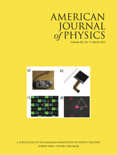
AMERICAN JOURNAL OF PHYSICS
metrics 2024
Catalyzing Knowledge in Physics and Astronomy.
Introduction
The American Journal of Physics (ISSN: 0002-9505, E-ISSN: 1943-2909), published by AIP Publishing, has been a cornerstone in the realm of physics education and research since its inception. With a broad scope that covers a plethora of topics in physics and astronomy, this journal serves as a vital resource for researchers, educators, and students alike, aiming to foster a deeper understanding of the fundamental principles of physics. As of 2023, it holds a commendable Q2 ranking in Physics and Astronomy (miscellaneous), reflecting its impactful contributions and rigorous peer-review process. Although the journal does not offer open access, it continues to be widely circulated, ensuring that groundbreaking research is accessible to a dedicated audience. The convergence of historical insights and contemporary advancements makes the American Journal of Physics an essential publication for those striving to stay at the forefront of the field.
Metrics 2024
 0.54
0.54 0.80
0.80 0.90
0.90 110
110Metrics History
Rank 2024
Scopus
IF (Web Of Science)
JCI (Web Of Science)
Quartile History
Similar Journals
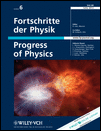
FORTSCHRITTE DER PHYSIK-PROGRESS OF PHYSICS
Unveiling Breakthroughs in Physics and AstronomyFORTSCHRITTE DER PHYSIK-PROGRESS OF PHYSICS, published by WILEY-V C H VERLAG GMBH, is a prestigious academic journal esteemed within the field of physics. With a history spanning over seven decades since its inception in 1953 and a converged publication up until 2024, this journal has established itself as a leading source for groundbreaking research and developments across diverse domains in physics and astronomy. Holding an influential Q1 ranking in the 2023 category of Physics and Astronomy (miscellaneous), it serves as an essential platform for disseminating high-quality research findings and theoretical advancements. Although not an Open Access publication, FORTSCHRITTE DER PHYSIK provides access to critical insights and scholarly discussions that are pivotal for researchers, professionals, and students alike. The journal is committed to contributing to the evolution of knowledge in physics, supporting the academic community through rigorous peer-reviewed articles, reviews, and innovative studies.
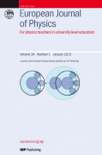
EUROPEAN JOURNAL OF PHYSICS
Driving Excellence in Physics ResearchEuropean Journal of Physics, published by IOP Publishing Ltd, is a premier international journal serving the diverse field of physics and astronomy. With a commitment to advancing scientific knowledge since its inception in 1980, the journal provides a platform for original research articles, reviews, and topical discussions in various domains, including theoretical and experimental physics. Operating out of the United Kingdom, the journal has achieved a commendable Q2 ranking in the Physics and Astronomy (miscellaneous) category for 2023, reflecting its robust influence in the academic community, alongside a notable Scopus Rank that underscores its relevance in both the Social Sciences and General Physics and Astronomy fields. Although it does not currently offer open access, the journal's traditional publication model ensures rigorous peer review, maintaining high scholarly standards that are imperative for researchers, professionals, and students striving to stay ahead in their respective fields. Don't miss the opportunity to engage with cutting-edge research and contribute to the ongoing dialogue in physics by accessing this vital resource.
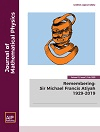
JOURNAL OF MATHEMATICAL PHYSICS
Illuminating the path of mathematical physics since 1960.Welcome to the JOURNAL OF MATHEMATICAL PHYSICS, a distinguished publication dedicated to the burgeoning fields of mathematical physics and statistical and nonlinear physics, published by AIP Publishing. Established in 1960, the journal continually showcases cutting-edge research and theoretical advancements that drive the understanding of complex systems and mathematical formulations within physics. With an impressive Scopus ranking of #38 in Mathematical Physics and #39 in Statistical and Nonlinear Physics, the journal is recognized for its vital contributions to the academic community, achieving a solid Q2 quartile ranking in both categories for 2023. While not an open-access journal, it remains a critical resource for researchers, professionals, and graduate students seeking insights into rigorous mathematical methods and their applications in physical sciences. Engage with the finest research as we converge toward new frontiers from 1960 to 2024, fostering academic collaboration and innovation.
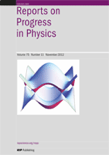
REPORTS ON PROGRESS IN PHYSICS
Charting new territories in the realm of physics and astronomy.Reports on Progress in Physics is a prestigious scholarly journal published by IOP Publishing Ltd, based in the United Kingdom. With an illustrious history dating back to 1934, this journal serves as a vital resource for researchers and professionals in the fields of physics and astronomy, offering comprehensive overviews of significant developments in these disciplines. It holds a commendable Q1 classification in both Medicine (miscellaneous) and Physics and Astronomy (miscellaneous) categories, further underscored by its impressive ranking as 4th out of 243 in the general physics and astronomy sector, placing it in the top 2% percentile on Scopus. The journal is dedicated to disseminating high-quality, peer-reviewed articles that facilitate the understanding of complex physical phenomena and their applications. Although it does not currently offer open access options, its rigorous editorial standards ensure that only the most impactful research reaches its wide audience of academics, practitioners, and students, solidifying its role as a cornerstone of knowledge in the physical sciences.

Ukrainian Journal of Physics
Advancing Physics Through Open DialogueUkrainian Journal of Physics, published by the Bogolyubov Institute for Theoretical Physics of the National Academy of Sciences of Ukraine, stands as a significant platform for the dissemination of research in the dynamic field of physics. With its ISSN 2071-0186 and E-ISSN 2071-0194, the journal aims to foster academic dialogue and innovation among researchers, professionals, and students alike. Recognized with a Scopus ranking that places it in the 26th percentile, the journal offers an array of contributions spanning various domains, including general physics and astronomy. Although currently categorized in the Q3 quartile for 2023, it seeks to elevate its scholarly impact while providing open access to its contents, facilitating wider availability and engagement. With a commitment to publishing high-quality research from 2007 to 2024, the journal embraces interdisciplinary approaches to physics, making it an invaluable resource for anyone dedicated to advancing their understanding and exploration of physical sciences.
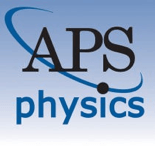
REVIEWS OF MODERN PHYSICS
Fostering Innovation in Physics and AstronomyREVIEWS OF MODERN PHYSICS, published by the American Physical Society, stands as a premier journal in the field of physics and astronomy, evidenced by its esteemed Q1 ranking in the 2023 category. With a notable ISSN of 0034-6861 and E-ISSN of 1539-0756, this journal has been a cornerstone for scholarly excellence since its inception in 1929. Operating from the heart of the United States at One Physics Eklipse, College Park, MD 20740-3844, REVIEWS OF MODERN PHYSICS enjoys a significant reputation, holding a top rank of #1 out of 243 in the Scopus rankings for General Physics and Astronomy, and securing its place in the 99th percentile. While it does not provide open access, the journal remains a critical resource for researchers and students alike, offering comprehensive reviews and breakthroughs that drive innovation and understanding in modern physics. As it converges towards its centennial year in 2024, the journal continues to foster significant academic discourse, making it an invaluable platform for the dissemination of pioneering ideas and research outcomes.
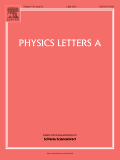
PHYSICS LETTERS A
Bridging Theory and Application in PhysicsPhysics Letters A is a renowned scientific journal published by Elsevier, dedicated to the field of physics and astronomy. Established in 1963, it has continuously evolved, offering a platform for the swift dissemination of significant research findings in various branches of physics. As of 2023, it holds a commendable Q2 ranking in the category of Physics and Astronomy (miscellaneous) and ranks 69th out of 243 journals in the same domain according to Scopus, positioning itself in the 71st percentile of academic impact. With its comprehensive scope, Physics Letters A provides a vital resource for researchers, professionals, and students, facilitating academic discourse and advancing knowledge across the field. Although it does not currently offer Open Access options, its rigorous peer-review process ensures high-quality content. It is centrally located in Amsterdam, Netherlands, and continues to be an essential outlet for innovative contributions to the physics community through the year 2024 and beyond.

Lithuanian Journal of Physics
Illuminating Insights in Physics ResearchWelcome to the Lithuanian Journal of Physics, an esteemed publication helmed by the Lithuanian Physical Society, dedicated to advancing the field of physics and astronomy. Established in 2008 and continually publishing insightful research through 2024, this journal aims to provide a platform for high-quality scholarly articles that contribute to the understanding of various physical phenomena. With a steady presence in the academic landscape, the journal is currently ranked in the fourth quartile of the Physics and Astronomy category and is positioned at the 18th percentile in its Scopus ranking, reflecting its niche focus and accessibility for researchers and students alike. Although currently not operating under an open access model, the journal remains a vital resource for professionals seeking to stay informed on the latest developments in the field. The Lithuanian Journal of Physics invites contributions that inspire collaboration and innovation in physical sciences, making it an invaluable resource for the global scientific community seeking to expand knowledge within this dynamic field.
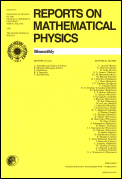
REPORTS ON MATHEMATICAL PHYSICS
Illuminating the Foundations of Physical PhenomenaREPORTS ON MATHEMATICAL PHYSICS is a distinguished journal published by PERGAMON-ELSEVIER SCIENCE LTD, focusing on the intricate interplay between mathematics and physics. Established in the United Kingdom, this journal has been contributing to the academic community since its inception, publishing significant research findings that explore the theoretical underpinnings of physical phenomena. With an ISSN of 0034-4877 and an E-ISSN of 1879-0674, the journal maintains a consistent publishing history, converging research from 1970 to 2024. It is currently ranked Q3 in both Mathematical Physics and Statistical and Nonlinear Physics categories, reflecting its commitment to maintaining a high standard of scholarly work. Although it lacks Open Access options, its targeted audience of researchers, professionals, and students will find invaluable insights into advanced mathematical methods, statistical applications, and innovative approaches in physics. With its esteemed reputation and critical role in the field, REPORTS ON MATHEMATICAL PHYSICS continues to be an essential resource for those seeking to deepen their understanding of mathematical applications in physical systems.
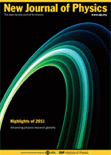
NEW JOURNAL OF PHYSICS
Shaping the future of physics through collaboration.NEW JOURNAL OF PHYSICS, published by IOP Publishing Ltd, is a prestigious open-access journal that has been at the forefront of the physics community since its inception in 1998. With an impact factor that places it in the Q1 category of Physics and Astronomy (miscellaneous) and a commendable ranking of #49 out of 243 in the general physics and astronomy category according to Scopus, this journal is recognized for its significant contribution to advancing research in the field. The journal caters to a broad scope of topics, providing a platform for the dissemination of cutting-edge research findings and innovative theoretical explorations. Operating from the United Kingdom, it offers a truly international perspective, making its contents accessible and impactful to a global audience. With robust open-access options, the NEW JOURNAL OF PHYSICS ensures that research findings are freely available, promoting collaboration and knowledge sharing among researchers, professionals, and students alike. This commitment to accessibility, combined with its high-quality content, makes it an essential resource for anyone engaged in the physics community.